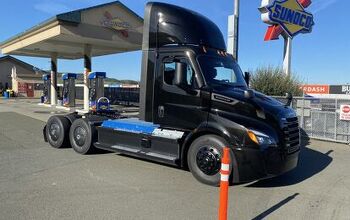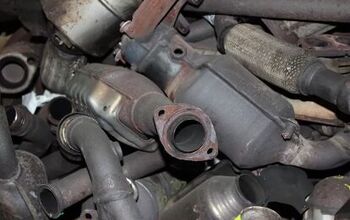Hammer Time: Might As Well Go For A Soda
“Steve, what car should I buy?”
“Well, if I give you the real answer, you’ll roll your eyes and buy what you want anyway.”
“No really. I’m open to new ideas.”
“Okay then! Buy a 2012 Malibu. Buy a Buick Park Avenue. Buy a Dodge Raider or buy a Suzuki Equator.”
“Ummm… are you sure about that?”
“Hell no! Now go buy me a soda and buy yourself a Camry!”
A lot of enthusiasts give grief to the mainstream publications in this business. Sometimes I kinda don’t get why because to be brutally blunt, the “best car” is usually firmly planted in the third row of most folk’s priorities when it comes to buying their next car.
For all the manufacturers desires to offer power, performance and utility together in one great vehicle, most of the general public just doesn’t care.
They usually want a brand first. Looks second. Then there’s fuel economy, safety, perceived quality… and a long, long list of excuses to get away from the less popular alternatives.
The best new car is rarely the best selling car in this business. There are Mazdas that I love which have a snowballs chance in hell of taking on the Toyotas and Chevys. Even if they do a far better job of checking off most consumer’s real world priorities, it’s a moot point and an inevitable outcome.
If Volvo came out with a breakthrough product, I seriously doubt that most shoppers of prestige brands would even remotely consider it. Never mind that there are plenty of reputable sources out there that can help dispel those myths as to which models now offer the best bang for the buck. Volvo no longer ranks in the pantheons of marketplace leaders. Case closed.
Even when mainstream publication have the gall to endorse an Oldsmobile or a Suzuki over a Camry or an Accord, the result of that neighborly advice is that people just won’t take it.
Why? People are brand loyal, and they are bias loyal.
That Ford station wagon that killed Aunt Edna’s dog 35 years ago? Well, that just means Detroit cars are pure crap. Never mind that carsurvey, TrueDelta, and even the long-term reliability index I am co-developing have disproved a lot of those myths.
Cadillac can’t ever match a Mercedes. Mercedes isn’t as good as a Lexus. Lexus isn’t as good as a BMW. On and on through the merry go round of biases and BS until you can’t help but SAAB at the futility of recommending a great car at a steal of a price.
Kizashi! What? Exactly. It’s a great car if you play around with a stickshift version. You say you’re an enthusiast… but then when I recommend a stick version, you look at me like I’m from Mars.
The truth is that enthusiast cars don’t sell. The best cars for pure driving enjoyment, don’t sell. The Miata has been shucked in the low 10k range of annual sales for a long time now. Mustangs? An ungodly sales decline. There are some who blame these types of things on demographics or the police state. But I have a third theory.
American tastes increasingly resemble the American interstate. There is a sameness and sadness to the menu which is dictating that the best cars are psychologically unaccessible. Nobody wants to get off the straight and dull road that leads to the Camcrods, the Cor-antr-ics and the American badged truck.
Are all those models good? Well, yeah. But good seldom equals love. You want love? Go tear down a bias and rediscover why a great car is worthy buying.
Don’t forget the radar detector.
P.S. : Feel free to share your thoughts below on great cars that have missed that elusive mark of mainstream acceptance over the years. I am going to be spending most of today getting a bonded title for a 21 year old Cadillac limousine. I will need intensive comic relief thanks to the interminable tortures that come with taking care of that type of title issue at the DMV. So please, feel free to share your stories and insights. I can always be reached directly at steve.lang@thetruthaboutcars.com .
More by Steven Lang
Latest Car Reviews
Read moreLatest Product Reviews
Read moreRecent Comments
- Jalop1991 In a manner similar to PHEV being the correct answer, I declare RPVs to be the correct answer here.We're doing it with certain aircraft; why not with cars on the ground, using hardware and tools like Telsa's "FSD" or GM's "SuperCruise" as the base?Take the local Uber driver out of the car, and put him in a professional centralized environment from where he drives me around. The system and the individual car can have awareness as well as gates, but he's responsible for the driving.Put the tech into my car, and let me buy it as needed. I need someone else to drive me home; hit the button and voila, I've hired a driver for the moment. I don't want to drive 11 hours to my vacation spot; hire the remote pilot for that. When I get there, I have my car and he's still at his normal location, piloting cars for other people.The system would allow for driver rest period, like what's required for truckers, so I might end up with multiple people driving me to the coast. I don't care. And they don't have to be physically with me, therefore they can be way cheaper.Charge taxi-type per-mile rates. For long drives, offer per-trip rates. Offer subscriptions, including miles/hours. Whatever.(And for grins, dress the remote pilots all as Johnnie.)Start this out with big rigs. Take the trucker away from the long haul driving, and let him be there for emergencies and the short haul parts of the trip.And in a manner similar to PHEVs being discredited, I fully expect to be razzed for this brilliant idea (not unlike how Alan Kay wasn't recognized until many many years later for his Dynabook vision).
- B-BodyBuick84 Not afraid of AV's as I highly doubt they will ever be %100 viable for our roads. Stop-and-go downtown city or rush hour highway traffic? I can see that, but otherwise there's simply too many variables. Bad weather conditions, faded road lines or markings, reflective surfaces with glare, etc. There's also the issue of cultural norms. About a decade ago there was actually an online test called 'The Morality Machine' one could do online where you were in control of an AV and choose what action to take when a crash was inevitable. I think something like 2.5 million people across the world participated? For example, do you hit and most likely kill the elderly couple strolling across the crosswalk or crash the vehicle into a cement barrier and almost certainly cause the death of the vehicle occupants? What if it's a parent and child? In N. America 98% of people choose to hit the elderly couple and save themselves while in Asia, the exact opposite happened where 98% choose to hit the parent and child. Why? Cultural differences. Asia puts a lot of emphasis on respecting their elderly while N. America has a culture of 'save/ protect the children'. Are these AV's going to respect that culture? Is a VW Jetta or Buick Envision AV going to have different programming depending on whether it's sold in Canada or Taiwan? how's that going to effect legislation and legal battles when a crash inevitibly does happen? These are the true barriers to mass AV adoption, and in the 10 years since that test came out, there has been zero answers or progress on this matter. So no, I'm not afraid of AV's simply because with the exception of a few specific situations, most avenues are going to prove to be a dead-end for automakers.
- Mike Bradley Autonomous cars were developed in Silicon Valley. For new products there, the standard business plan is to put a barely-functioning product on the market right away and wait for the early-adopter customers to find the flaws. That's exactly what's happened. Detroit's plan is pretty much the opposite, but Detroit isn't developing this product. That's why dealers, for instance, haven't been trained in the cars.
- Dartman https://apnews.com/article/artificial-intelligence-fighter-jets-air-force-6a1100c96a73ca9b7f41cbd6a2753fdaAutonomous/Ai is here now. The question is implementation and acceptance.
- FreedMike If Dodge were smart - and I don't think they are - they'd spend their money refreshing and reworking the Durango (which I think is entering model year 3,221), versus going down the same "stuff 'em full of motor and give 'em cool new paint options" path. That's the approach they used with the Charger and Challenger, and both those models are dead. The Durango is still a strong product in a strong market; why not keep it fresher?

































Comments
Join the conversation
There is another factor that feeds into all of this. The dealer and support after the sale. -My father's 1996 Ford Windstar's drivetrain self destructed between 50 and 60K miles. Ford ran him through the wringer on when he got his oil changes, trans service, etc; even though they KNEW they had major issues with drivetrain reliability. -My brother's 2001 Honda Odyssey, bought second hand, had a transmission go out at 98K miles. Honda replaced it, no questions asked. Taking into account the above, I would think that Honda and Ford could change their product lines and most consumer's would still buy, or not buy, from the dealer they had good or bad luck with.
I'm going to put the Kia Rondo out there - it's from that time period between Hyundai turning Kia from a credit criminal-grade ticking time bomb on wheels to a legitimate automobile, and the point when Peter Schreyer's styling and anthropomorphic hamsters made people pay attention to them. On top of that, it's a weird, gawky tall wagon/minivan thing. But at the same time, it's a fine, unobjectionable vehicle, plenty spacious, and because it's an odd bodystyle, not worth a ton used.